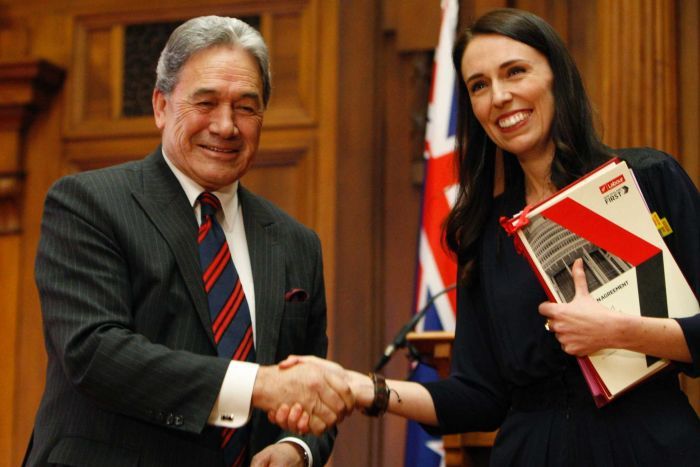Australia/Israel Review
AIR New Zealand: Wellington Surprise
Nov 2, 2017 | Miriam Bell

It took a while but, nearly a month after Election Day, New Zealanders found out they had a new government. And, in a stunning turnaround of fortune for the Left, that government will be a Labour-NZ First coalition with support from the Green Party.
New Zealand has had a National-led government for nine years and, just a few months ago as the election campaign kicked off, it looked as though National would storm through to win another three year term. But the resignation of then Labour Party leader Andrew Little initiated a chain of events which changed everything.
An enthusiastic wave of support for the new Labour leader, and now Prime Minister, Jacinda Ardern meant that on Election Day the Labour Party won 36.9% of the vote, which equates to 46 seats in Parliament. However, the National Party won 44.4% of the vote, equalling 56 seats in Parliament.
Under the country’s mixed-member proportionate (MMP) electoral system, this meant that neither party had the 61 seats required to form a government outright and a coalition of parties amounting to 61 seats had to be assembled.
Labour’s long-time political ally, the Green Party, won 6.3% of the vote, which equates to 8 seats in Parliament. This boosted the Left faction’s block of seats to 54 – still short of that 61 seat target, or even the National total.
This meant that, once again, the wily old dog of New Zealand politics, Winston Peters, took on the role of kingmaker. His NZ First party won 7.2% of the vote and 9 seats in Parliament. Without NZ First, neither National nor the Labour-Green block could form a government.
Cue weeks of tensely reported negotiations and cloak and dagger meetings between the various political players. It was a case of history repeating itself. Back in 1996, Peters became Deputy Prime Minister after going into coalition with the National Party. In 2005, he became Foreign Minister after going into coalition with the Labour Party.
Peters, clearly relishing being kingmaker yet again, took his decision-making on which party to go with right down to the wire. Eventually, he announced that he would be going into coalition with Labour and, by extension, the Green Party.
His explanation indicated that concerns about the country’s growing inequalities and social problems, like a major housing shortage, were behind his decision.
But for the Jewish community and supporters of Israel, the composition of the new government raised question marks over how it might impact New Zealand’s relationship with Israel, which has sometimes been rocky over recent years.
That’s because there are elements within the Green Party which have been extremely critical of Israel. Most notably, Green MP Marama Davidson last year took part in a “freedom flotilla” aimed at breaching the Israeli naval blockade of Gaza.
The Labour Party has a mixed record on Israel. While there are some very anti-Israel elements within the party, there are also some very supportive ones. Labour supported the action taken by New Zealand’s last National government in late 2015 to co-sponsor UN Resolution 2334, which one-sidedly criticised Israel over settlements, and seemed to foreclose changes to the 1967 armistice lines. Senior Labour MP David Parker, who is likely to be a minister, called former Foreign Minister Gerry Brownlee’s attempts to repair the damage to relations with Israel created by Resolution 2334 “ill considered”.
Ardern’s views on Israel are simply unknown. While she spent time in Israel as president of the International Union of Socialist Youth, she hasn’t yet made any public comment about Israel-related issues.
Balancing out these uncertainties is Peters who will become both Deputy Prime Minister and Foreign Minister. Peters publicly opposed 2334 and has long been a vocal supporter of Israel.
Meanwhile, the NZ First deputy leader, Ron Marks, is reportedly to become Defence Minister.
Israel Institute of New Zealand co-director Paul Moon says he thinks the alliance with New Zealand First presents an opportunity for New Zealand to recalibrate its relations with Israel. It could enable the government to draw a line under the controversy over sponsorship of 2334, he said.
“There are opportunities for trade, academic cooperation, technological partnerships, and the fostering of relationships in the arts that could be advanced under the next government… The Israel Institute is hopeful that a new and exciting level of partnership with Israel is imminent.”
Much will depend on the allocation of ministerial portfolios.
Under the coalition agreement, NZ First will get four ministers and the Green Party will get three junior ministries, plus each will get a parliamentary under-secretaryship.
Green Party leader James Shaw, who is well respected in the business community, has announced the Green MPs who will take up ministerial portfolios will be himself, Julie-Anne Genter (a member of the NZ-Israel Parliamentary Friends group), Eugenie Sage and Jan Logie. Marama Davidson will not be a minister.
The times they are a-changing in Wellington – but it as yet unclear if those changes bode well for the New Zealand-Israel relationship.
Tags: Israel, New Zealand






